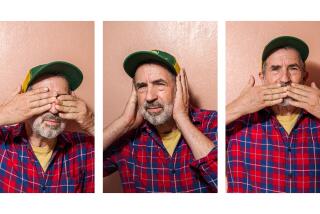TV Reviews : The Beastly Ways Humans Abuse Apes
- Share via
The “National Geographic Explorer” series delivers two hours of “Apes and Humans” at 6 p.m. Sunday on cable’s TBS network. Not all of it is satisfying.
The package of three documentaries begins with “Secret World of the Chimpanzee,” pretty much a routine half-hour except for a fascinatingly grisly sequence showing adult male chimps working as a team while hunting small colobus monkeys in the West African rain forest. It ends with a rerun of “Urban Gorilla,” a superior, essentially grim film chronicling the lives of the greatest of the great apes in captivity.
Somewhat buried as the middle member of this trio is “Ape Trade,” National Geographic’s diluted, dismembered version of a powerful, shocking, meticulously reported BBC documentary about the illegal trafficking of orangutans on a global scale.
We see poachers, in the rain forests of Sumatra and Borneo, slaughter adult female orangutans to get their babies, who are immediately placed on a lucrative ape-smuggling conveyor belt that operates in violation of an international agreement that is supposed to protect orangutans.
Through a series of complex, murky maneuvers featuring enough couriers and secret transits to fill an espionage thriller, large numbers of these captured young wind up as “designer pets” for humans. And nowhere, we’re told, are orangutans more exploited as cute, cuddly toys than in Taiwan, where, after their novelty has worn off, many are abandoned to the streets by their human “hosts.”
The centerpiece of the program is the case of the “Bangkok Six,” a group of baby orangutans discovered in Bangkok’s international airport, crammed into boxes, dehydrated, starving and near death. Three ultimately did die.
Primarily through the undercover work of Dennis Van de Bunt of the Summerville, S.C.-based International Primate Protection League, “Ape Trade” traces the route and destination of the “Bangkok Six,” and it’s a compelling story. Not nearly as much so, however, as the fuller incredible account in the BBC documentary that National Geographic cut in half for U.S. television.
Inexplicably eliminated from Sunday’s presentation, for example, is Mathew Block, the mysterious Miami animal dealer whom the BBC dealt with extensively and who at the time was under investigation by authorities for his alleged role in the “Bangkok Six.” Last month, Block was indicted by a Miami grand jury in connection with the case, making Sunday’s omission even more glaring.
A National Geographic spokesperson said that the Block indictment is cited briefly by host Robert Urich in an alternate introduction that was shot in anticipation of the indictment. She said that Block was cut out of the documentary because “we did not want to get involved in a legal wrangle with him.” So much for exploration.
More to Read
The complete guide to home viewing
Get Screen Gab for everything about the TV shows and streaming movies everyone’s talking about.
You may occasionally receive promotional content from the Los Angeles Times.






